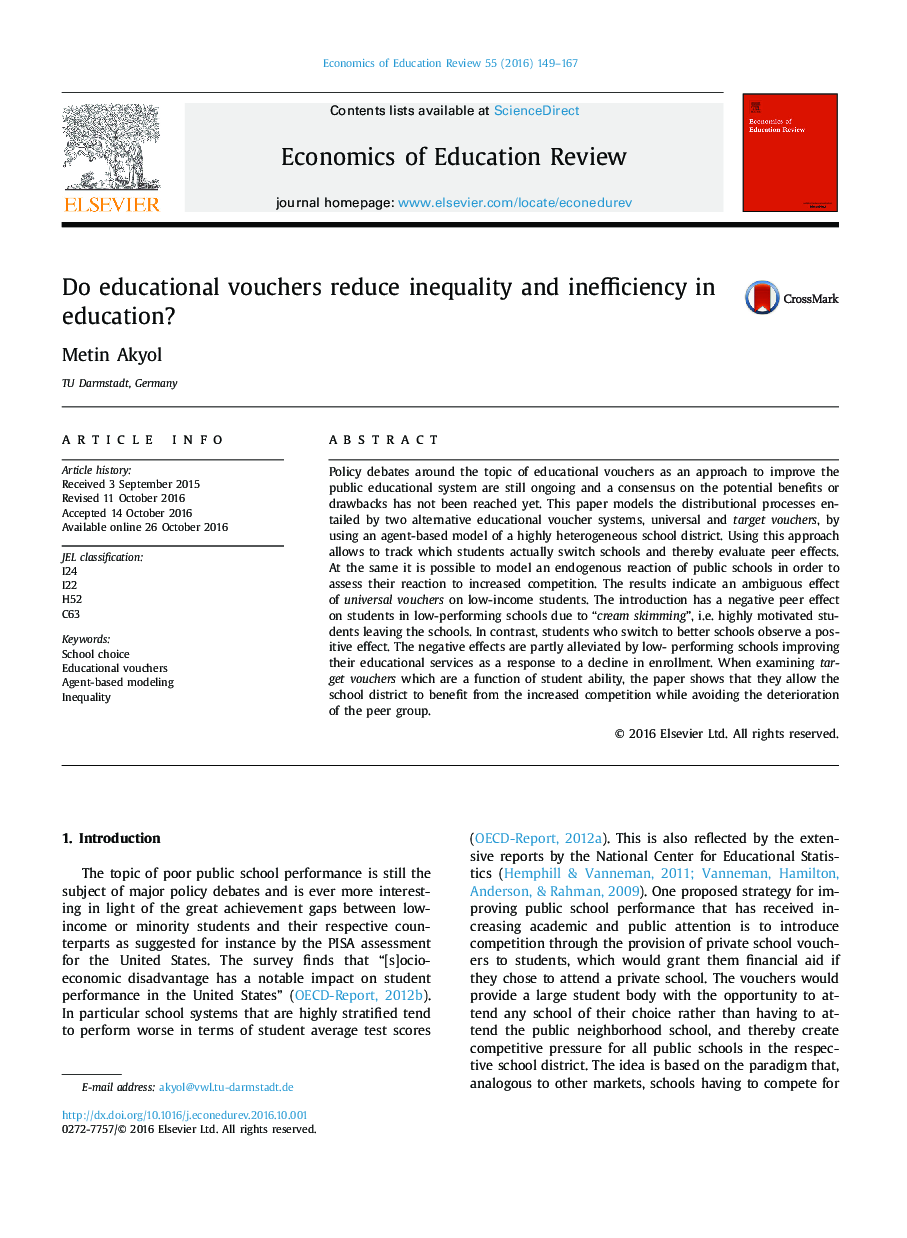| کد مقاله | کد نشریه | سال انتشار | مقاله انگلیسی | نسخه تمام متن |
|---|---|---|---|---|
| 4938288 | 1434808 | 2016 | 19 صفحه PDF | دانلود رایگان |
عنوان انگلیسی مقاله ISI
Do educational vouchers reduce inequality and inefficiency in education?
ترجمه فارسی عنوان
کوپن های آموزشی باعث کاهش نابرابری و ناکارآمدی در آموزش می شوند؟
دانلود مقاله + سفارش ترجمه
دانلود مقاله ISI انگلیسی
رایگان برای ایرانیان
کلمات کلیدی
ترجمه چکیده
بحث سیاست در مورد موضوع کوپن های آموزشی به عنوان یک رویکرد برای بهبود سیستم آموزشی عمومی هنوز در حال انجام است و اجماع در مورد مزایای بالقوه یا نقص ها هنوز به دست نیامده است. این مقاله، فرآیندهای توزیع شده را با استفاده از دو سیستم جایگزین آموزش کوپن، کوپن های جهانی و هدف، با استفاده از یک مدل مبتنی بر عامل از یک ناحیه مدرسه بسیار ناهمگون، مدل می کند. با استفاده از این روش، می توانید مسیری را که دانش آموزان در حال تغییر در مدارس هستند و در نتیجه اثرات همکار را ارزیابی می کنند. در همین حالت، واکنش های درونزای مدارس دولتی به منظور ارزیابی واکنش آنها به افزایش رقابت ممکن است. نتایج نشان می دهد اثر متضاد کوپن های جهانی برای دانشجویان کم درآمد. این مقدمه تأثیرات منفی همیشگی بر دانش آموزان مدارس کم کار را به علت خشونت کرمی، یعنی دانش آموزان بسیار محرمانه که از مدارس خارج می شوند، تأثیر می گذارد. در مقابل، دانش آموزانی که به مدارس بهتر می روند، تأثیر مثبتی دارند. تأثیرات منفی به وضوح توسط مدارس کم کار در حال بهبود خدمات آموزشی خود به عنوان یک پاسخ به کاهش ثبت نام است. هنگام بررسی کوپنهای هدف
این کارکردی از توانایی دانش آموزان است، این مقاله نشان می دهد که آنها اجازه می دهد تا منطقه مدرسه از افزایش رقابت سود ببرند و در عین حال اجتناب از تضعیف گروه همکار.
موضوعات مرتبط
علوم انسانی و اجتماعی
اقتصاد، اقتصادسنجی و امور مالی
اقتصاد و اقتصادسنجی
چکیده انگلیسی
Policy debates around the topic of educational vouchers as an approach to improve the public educational system are still ongoing and a consensus on the potential benefits or drawbacks has not been reached yet. This paper models the distributional processes entailed by two alternative educational voucher systems, universal and target vouchers, by using an agent-based model of a highly heterogeneous school district. Using this approach allows to track which students actually switch schools and thereby evaluate peer effects. At the same it is possible to model an endogenous reaction of public schools in order to assess their reaction to increased competition. The results indicate an ambiguous effect of universal vouchers on low-income students. The introduction has a negative peer effect on students in low-performing schools due to “cream skimming”, i.e. highly motivated students leaving the schools. In contrast, students who switch to better schools observe a positive effect. The negative effects are partly alleviated by low- performing schools improving their educational services as a response to a decline in enrollment. When examining target vouchers
which are a function of student ability, the paper shows that they allow the school district to benefit from the increased competition while avoiding the deterioration of the peer group.
ناشر
Database: Elsevier - ScienceDirect (ساینس دایرکت)
Journal: Economics of Education Review - Volume 55, December 2016, Pages 149-167
Journal: Economics of Education Review - Volume 55, December 2016, Pages 149-167
نویسندگان
Metin Akyol,
